Campus/People
-
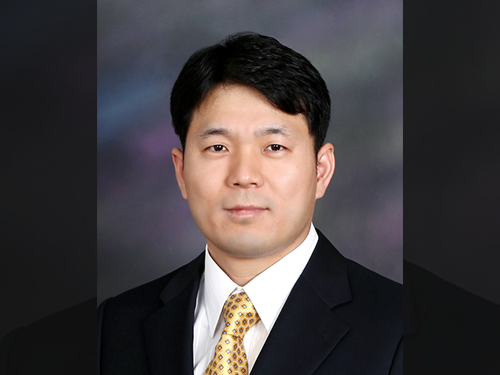 Professor Hee-Sung Park Named Scientist of May
(Professor Hee-Sung Park)
Professor Hee-Sung Park from the Department of Chemistry was named ‘Scientist of May’ sponsored by the Ministry of Science and ICT and the National Research Foundation of Korea. Professor Park was honored in recognition of his developing a tool to engineer designer proteins via diverse chemical modifications. This approach provides a novel platform for investigating numerous diseases such as cancer and dementia.
His research focuses on the production of synthetic proteins and the generation of diverse protein functions as well as the designing and engineering of new translation machinery for genetic code expansion, and the application of synthetic biology techniques for basic cell biology and applied medical science.
Post-translational modifications (PTMs) are constantly taking place during or after protein biosynthesis. PTMs play a vital role in expanding protein functional diversity and, as a result, critically affect numerous biological processes. Abnormal PTMs have been known to trigger various diseases including cancer and dementia. Therefore, this technology enables proteins to reproduce with specific modifications at selected residues and will significantly help establish experimental strategies to investigate fundamental biological mechanisms including the development of targeted cancer therapies.
Professor Park also received 10 million KRW in prize money.
2018.05.04 View 10830
Professor Hee-Sung Park Named Scientist of May
(Professor Hee-Sung Park)
Professor Hee-Sung Park from the Department of Chemistry was named ‘Scientist of May’ sponsored by the Ministry of Science and ICT and the National Research Foundation of Korea. Professor Park was honored in recognition of his developing a tool to engineer designer proteins via diverse chemical modifications. This approach provides a novel platform for investigating numerous diseases such as cancer and dementia.
His research focuses on the production of synthetic proteins and the generation of diverse protein functions as well as the designing and engineering of new translation machinery for genetic code expansion, and the application of synthetic biology techniques for basic cell biology and applied medical science.
Post-translational modifications (PTMs) are constantly taking place during or after protein biosynthesis. PTMs play a vital role in expanding protein functional diversity and, as a result, critically affect numerous biological processes. Abnormal PTMs have been known to trigger various diseases including cancer and dementia. Therefore, this technology enables proteins to reproduce with specific modifications at selected residues and will significantly help establish experimental strategies to investigate fundamental biological mechanisms including the development of targeted cancer therapies.
Professor Park also received 10 million KRW in prize money.
2018.05.04 View 10830 -
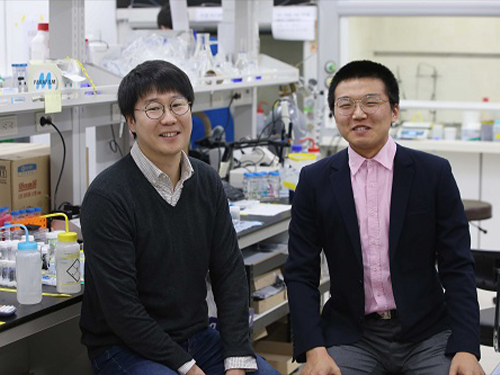 Undergrad's Paper Chosen as the Cover Article in Soft Matter
(from left: Research Professor KyuHan Kim and Undergrad Student Subeen Kim)
A KAIST undergraduate student, Subeen Kim, had his paper chosen as the cover article in an international journal during his senior year.
There have been an increasing number of undergraduate students who were published as the first author because the KAIST Undergraduate Research Participation program allows more active research participation by undergraduate students.
Through URP, Kim successfully published his paper in the internationally-renowned journal, Soft Matter, which is published by the Royal Society of Chemistry, and it was chosen as the cover article of that journal in February 2018.
This publication means a lot to him because he designed the cover image himself, based on his imagination and observations.
His research is about controllable one-step double emulsion formation. Double emulsion is a system in which dispersed droplets contain additional immiscible liquid droplets.
Having great retention ability, double emulsion has been used in various applications in the food industry, in cosmetics, and for drug delivery. Nevertheless, two-step emulsification is a conventional approach to produce double emulsions that typically leads to partial destabilization of the emulsion formed during the initial stage. Hence, it does not ensure the stability of a double emulsion. On the other hand, a microfluidic approach with various flow-focusing techniques has been developed, but it has low production efficiency and thus limited industrial applications.
Kim’s results came from the process of phase inversion to solve this problem. He identified the instant formation of double emulsions during the process of phase inversion. Based on this finding, he proposed criteria to achieve high stability of double emulsion.
Through constant research, he developed a quite general method using a combination of an oil soluble poly methyl methacrylate (PMMA) and hydrophobic silica nanoparticle (HDK H18). This new method enables one-step and stable production of double emersions in a stable manner. It also allows control of the number and the volume of inner oil droplets inside the outer water droplets by adjusting PMMA and HDK H18.
Kim enrolled at KAIST as a KAIST Presidential Fellowship and Presidential Science Scholarship in 2014. While studying both chemical and biomolecular engineering and chemistry he has been developing his hypothesis and conducting research.
He was able to begin conducting research because he has taken part in URP projects twice. In his sophomore year, he studied the formation of high internal phase double emulsions. After one year, he conducted research to produce superabsorbent resins, which are the base material for diapers, by using colloid particles. Using partial research outcomes, he published his paper in Nature Communications as a second author.
Kim said, “Double majoring the chemical and biomolecular engineering and chemistry has helped me producing this outcome. I hope that this research contributes to commercializing double emulsions. I will continue to identify accurate principles to produce chemicals that can be controlled exquisitely.”
Figure 1. The cover article of Soft Matter
2018.05.03 View 11394
Undergrad's Paper Chosen as the Cover Article in Soft Matter
(from left: Research Professor KyuHan Kim and Undergrad Student Subeen Kim)
A KAIST undergraduate student, Subeen Kim, had his paper chosen as the cover article in an international journal during his senior year.
There have been an increasing number of undergraduate students who were published as the first author because the KAIST Undergraduate Research Participation program allows more active research participation by undergraduate students.
Through URP, Kim successfully published his paper in the internationally-renowned journal, Soft Matter, which is published by the Royal Society of Chemistry, and it was chosen as the cover article of that journal in February 2018.
This publication means a lot to him because he designed the cover image himself, based on his imagination and observations.
His research is about controllable one-step double emulsion formation. Double emulsion is a system in which dispersed droplets contain additional immiscible liquid droplets.
Having great retention ability, double emulsion has been used in various applications in the food industry, in cosmetics, and for drug delivery. Nevertheless, two-step emulsification is a conventional approach to produce double emulsions that typically leads to partial destabilization of the emulsion formed during the initial stage. Hence, it does not ensure the stability of a double emulsion. On the other hand, a microfluidic approach with various flow-focusing techniques has been developed, but it has low production efficiency and thus limited industrial applications.
Kim’s results came from the process of phase inversion to solve this problem. He identified the instant formation of double emulsions during the process of phase inversion. Based on this finding, he proposed criteria to achieve high stability of double emulsion.
Through constant research, he developed a quite general method using a combination of an oil soluble poly methyl methacrylate (PMMA) and hydrophobic silica nanoparticle (HDK H18). This new method enables one-step and stable production of double emersions in a stable manner. It also allows control of the number and the volume of inner oil droplets inside the outer water droplets by adjusting PMMA and HDK H18.
Kim enrolled at KAIST as a KAIST Presidential Fellowship and Presidential Science Scholarship in 2014. While studying both chemical and biomolecular engineering and chemistry he has been developing his hypothesis and conducting research.
He was able to begin conducting research because he has taken part in URP projects twice. In his sophomore year, he studied the formation of high internal phase double emulsions. After one year, he conducted research to produce superabsorbent resins, which are the base material for diapers, by using colloid particles. Using partial research outcomes, he published his paper in Nature Communications as a second author.
Kim said, “Double majoring the chemical and biomolecular engineering and chemistry has helped me producing this outcome. I hope that this research contributes to commercializing double emulsions. I will continue to identify accurate principles to produce chemicals that can be controlled exquisitely.”
Figure 1. The cover article of Soft Matter
2018.05.03 View 11394 -
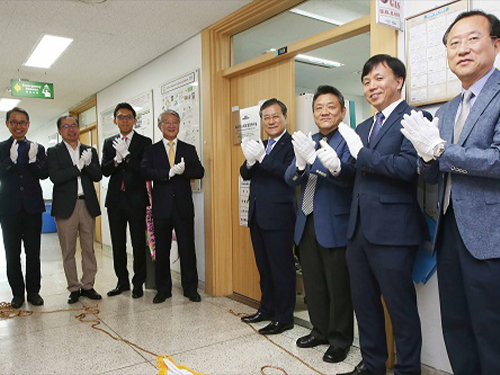 Cross-Generation Collaborative Labs Open
KAIST opened two cross-generation collaborative labs last month. This novel approach will pair up senior and junior faculty members for sustaining research and academic achievements even after the senior researcher retires.
This is one of the Vision 2031 innovation initiatives established to extend the spectrum of knowledge and research competitiveness. The selected labs will be funded for five years and the funding will be extended if necessary. KAIST will continue to select new labs every year.
A five-member selection committee including the Nobel Laureates Professor Klaus Von Klitzing at the Max-Planck Institute for Solid State Research and Dr. Kurt Wüthrich from ETH Zürich selected the first two labs with senior-junior pairs in March.
(Two renowned scholars' Cross-Generation Collaborative Labs which opened last month.
Distinguished Professor Lee's lab (above) andChair Professor Sung's lab)
Both labs are run by world-renowned scholars: the Systems Metabolic Engineering and Systems Healthcare Laboratory headed by Distinguished Professor Sang-Yup Lee in the Department of Chemical and Biomolecular Engineering and the Acousto-Microfluidics Research Center for Next-Generation Healthcare led by Chair Professor Hyung Jin Sung in the Department of Mechanical Engineering.
Distinguished Professor Lee will be teamed up with Professor Hyun Uk Kim, and their lab aims to mass produce new eco-friendly chemical materials as well as higher-value-added materials which will be used for medicine. The new platform technologies created in the lab are expected to provide information which will benefit human healthcare.
Meanwhile, the Acousto-Microfluidics Research Center for Next-Generation Healthcare will team up with Professors Hyoungsoo Kim and Yeunwoo Cho under Chair Professor Sung. The lab will conduct research on controlling fluids and objects exquisitely on a micro-nano scale by using high-frequency acoustic waves. The lab plans to develop a next-generation healthcare platform for customized diagnoses as well as disease treatment.
KAIST President Sung-Chul Shin, who introduced this novel idea in his research innovation initiative, said that he hopes the Cross-Generation Collaborative Labs will contribute to honoring senior scholars’ research legacies and passing knowledge down to junior researchers in order to further develop their academic achievements. He said, “I sincerely hope the labs will make numerous research breakthroughs in the very near future.”
2018.05.03 View 12531
Cross-Generation Collaborative Labs Open
KAIST opened two cross-generation collaborative labs last month. This novel approach will pair up senior and junior faculty members for sustaining research and academic achievements even after the senior researcher retires.
This is one of the Vision 2031 innovation initiatives established to extend the spectrum of knowledge and research competitiveness. The selected labs will be funded for five years and the funding will be extended if necessary. KAIST will continue to select new labs every year.
A five-member selection committee including the Nobel Laureates Professor Klaus Von Klitzing at the Max-Planck Institute for Solid State Research and Dr. Kurt Wüthrich from ETH Zürich selected the first two labs with senior-junior pairs in March.
(Two renowned scholars' Cross-Generation Collaborative Labs which opened last month.
Distinguished Professor Lee's lab (above) andChair Professor Sung's lab)
Both labs are run by world-renowned scholars: the Systems Metabolic Engineering and Systems Healthcare Laboratory headed by Distinguished Professor Sang-Yup Lee in the Department of Chemical and Biomolecular Engineering and the Acousto-Microfluidics Research Center for Next-Generation Healthcare led by Chair Professor Hyung Jin Sung in the Department of Mechanical Engineering.
Distinguished Professor Lee will be teamed up with Professor Hyun Uk Kim, and their lab aims to mass produce new eco-friendly chemical materials as well as higher-value-added materials which will be used for medicine. The new platform technologies created in the lab are expected to provide information which will benefit human healthcare.
Meanwhile, the Acousto-Microfluidics Research Center for Next-Generation Healthcare will team up with Professors Hyoungsoo Kim and Yeunwoo Cho under Chair Professor Sung. The lab will conduct research on controlling fluids and objects exquisitely on a micro-nano scale by using high-frequency acoustic waves. The lab plans to develop a next-generation healthcare platform for customized diagnoses as well as disease treatment.
KAIST President Sung-Chul Shin, who introduced this novel idea in his research innovation initiative, said that he hopes the Cross-Generation Collaborative Labs will contribute to honoring senior scholars’ research legacies and passing knowledge down to junior researchers in order to further develop their academic achievements. He said, “I sincerely hope the labs will make numerous research breakthroughs in the very near future.”
2018.05.03 View 12531 -
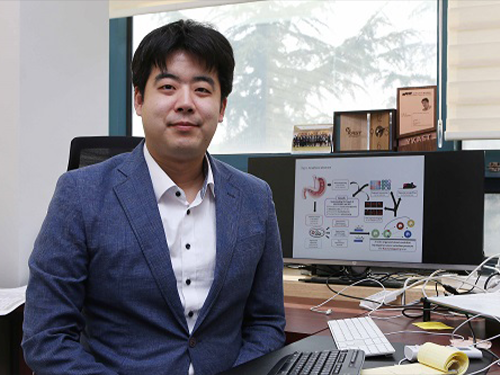 Professor Ju, to Receive Grants from HFSP
(Professor Young Seok Ju)
Professor Young Seok Ju from the Graduate School of Medical Science and Engineering was selected as a young investigator to receive research funds from the Human Frontiers Science Program.
The Human Frontiers Science Program (HFSP) was founded in 1989 with members of the G7 and European Union to stimulate innovative research in the field of life sciences.
Professor Ju placed third out of the eight teams that were selected from 158 applicants representing 60 countries. He is now the fourth Korean to receive a research grant as a young investigator. Professor Jae Kyoung Kim from the Department of Mathematical Sciences also received this prize last year, hence KAIST has produced grant recipients for two consecutive years.
Professor Ju is a medical doctor specializing in cancer genomics and computer biology. He has been studying somatic mutations and their functional consequences in human cancer in a bioinformatics way. He has published papers in international journals including Nature, Science, Genome Research, and Journal of Clinical Oncology.
With a title ‘Tracing AID/APOBEC- and MSI-mediated hyper-mutagenesis in the clonal evolution of gastric cancer,’ Professor Ju will receive 1.05 million dollars for three years along with Professor Bon-Kyoung Koo from the Institute of Molecular Biotechnology at Austrian Academy of Sciences, and Sinppert Hugo from University Medical Center Utrecht.
Professor Ju said, “As a young investigator, it is my great honor to receive this research fund from this organization. Through this internationally collaborative research, I will carry out groundbreaking research to understand the pathophysiology of cancers at a molecular level.”
2018.04.24 View 9212
Professor Ju, to Receive Grants from HFSP
(Professor Young Seok Ju)
Professor Young Seok Ju from the Graduate School of Medical Science and Engineering was selected as a young investigator to receive research funds from the Human Frontiers Science Program.
The Human Frontiers Science Program (HFSP) was founded in 1989 with members of the G7 and European Union to stimulate innovative research in the field of life sciences.
Professor Ju placed third out of the eight teams that were selected from 158 applicants representing 60 countries. He is now the fourth Korean to receive a research grant as a young investigator. Professor Jae Kyoung Kim from the Department of Mathematical Sciences also received this prize last year, hence KAIST has produced grant recipients for two consecutive years.
Professor Ju is a medical doctor specializing in cancer genomics and computer biology. He has been studying somatic mutations and their functional consequences in human cancer in a bioinformatics way. He has published papers in international journals including Nature, Science, Genome Research, and Journal of Clinical Oncology.
With a title ‘Tracing AID/APOBEC- and MSI-mediated hyper-mutagenesis in the clonal evolution of gastric cancer,’ Professor Ju will receive 1.05 million dollars for three years along with Professor Bon-Kyoung Koo from the Institute of Molecular Biotechnology at Austrian Academy of Sciences, and Sinppert Hugo from University Medical Center Utrecht.
Professor Ju said, “As a young investigator, it is my great honor to receive this research fund from this organization. Through this internationally collaborative research, I will carry out groundbreaking research to understand the pathophysiology of cancers at a molecular level.”
2018.04.24 View 9212 -
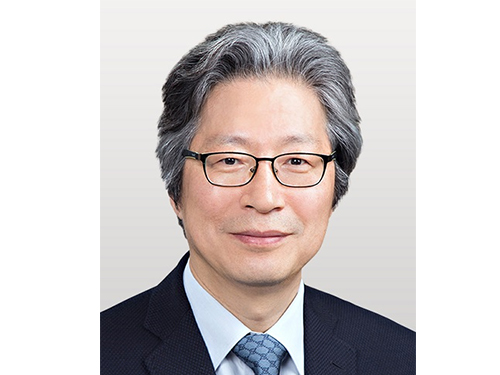 Professor Gou Young Koh, 2018 Laureate of Ho-Am Prize
Distinguished Professor Gou Young Koh from the Graduate School of Medical Science and Engineering was appointed a 2018 laureate in medicine of the Ho-Am Prize by the Ho-Am Foundation. Professor Koh is a renowned expert in the field of tumor angiogenesis by exploring the hidden nature of capillary and lymphatic vessels in human organs.
He was recognized for demonstrating the effective reduction of tumor progression and metastasis via tumor vessel normalization. This counterintuitive study result is regarded as a stepping stone for a drug discovery to prevent microvascular diseases.
Besides Professor Koh, Professor Hee Oh from Yale University (Science), Professor Nam-Gyu Park from Sungkyunkwan University (Engineering), Opera Singer Kwangchul Youn (The Arts) and Sister Carla Kang (Community Service) received awards.
The Ho-Am Prize is presented to individuals who have contributed to academics, the arts, and social development, or furthered the welfare of humanity, and commemorates the noble spirit of public service espoused by the late Chairman Byung-chull Lee, who used the pen name Ho-Am.
It was established in 1990 by Kun-Hee Lee, the chairman of Samsung. Awards have been presented to 143 individuals worth a total of 24.4 billion KRW.
2018.04.11 View 8860
Professor Gou Young Koh, 2018 Laureate of Ho-Am Prize
Distinguished Professor Gou Young Koh from the Graduate School of Medical Science and Engineering was appointed a 2018 laureate in medicine of the Ho-Am Prize by the Ho-Am Foundation. Professor Koh is a renowned expert in the field of tumor angiogenesis by exploring the hidden nature of capillary and lymphatic vessels in human organs.
He was recognized for demonstrating the effective reduction of tumor progression and metastasis via tumor vessel normalization. This counterintuitive study result is regarded as a stepping stone for a drug discovery to prevent microvascular diseases.
Besides Professor Koh, Professor Hee Oh from Yale University (Science), Professor Nam-Gyu Park from Sungkyunkwan University (Engineering), Opera Singer Kwangchul Youn (The Arts) and Sister Carla Kang (Community Service) received awards.
The Ho-Am Prize is presented to individuals who have contributed to academics, the arts, and social development, or furthered the welfare of humanity, and commemorates the noble spirit of public service espoused by the late Chairman Byung-chull Lee, who used the pen name Ho-Am.
It was established in 1990 by Kun-Hee Lee, the chairman of Samsung. Awards have been presented to 143 individuals worth a total of 24.4 billion KRW.
2018.04.11 View 8860 -
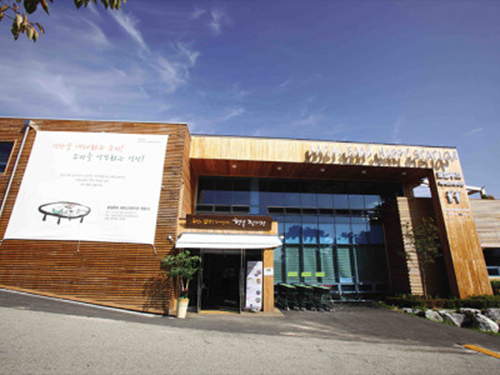 KAIST Develops IoT Platform for Food Safety
A research team led by the KAIST Auto-ID Labs developed a GS1 international standard-based IoTs infrastructure platform dubbed Oliot (Open Language of Internet of Things). This platform will be applied to Wanju Local Food, the nation’s largest cooperative, and will be in operation from April 5.
A total of eleven organizations participated in the development of Oliot, with KAIST as the center. This consortium is based on the GS1 international standard-based Oliot platform, which allows collecting and sharing data along the entire process of agrifood from production to processing, distribution, and consumption. It aims at increasing farm incomes and establishing a global ecosystem of domestic agriculture and stockbreeding that provides safe food.
Wanju Local Food is now the world’s first local food co-op with a traceability system from the initial stage of production planning to end sales based on GS1 international standards, which will ensure food safety.
KAIST has been sharing Oliot data in order to apply it to industries around the world. As of April 2018, approximately 900 enterprises and developers from more than 100 countries have downloaded it.
Professor Daeyoung Kim from the School of Computing, who is also Research Director of Auto-ID Labs said, “We are planning to disseminate Oliot to local food cooperatives throughout the nation. We will also cooperate with other countries, like China, Holland, and Hong Kong to create a better ecosystem for the global food industry.
“We are currently collaborating with related business to converge Oliot with AI or blockchain technology that can be applied to various services, such as healthcare and smart factories. Its tangible outcome will be revealed soon,” he added.
Auto-ID Labs are a global research consortium of six academic institutions that research and develop new technologies for advancing global commerce, partnering with GS1 (Global Standard 1), a non-profit organization that established standards for global commerce such as introducing barcodes to the retail industry. The Auto-ID Labs include MIT, University of Cambridge, Keio University, Fudan University, ETH Zurich/University of St. Gallen, and KAIST.
The consortium was supported by the Ministry of Science and ICT as well as the Institute for Information and Communications Technology Promotion for three years from 2015.
The launching of Oliot at Wanju Local Food will be held on April 5.
2018.04.03 View 9841
KAIST Develops IoT Platform for Food Safety
A research team led by the KAIST Auto-ID Labs developed a GS1 international standard-based IoTs infrastructure platform dubbed Oliot (Open Language of Internet of Things). This platform will be applied to Wanju Local Food, the nation’s largest cooperative, and will be in operation from April 5.
A total of eleven organizations participated in the development of Oliot, with KAIST as the center. This consortium is based on the GS1 international standard-based Oliot platform, which allows collecting and sharing data along the entire process of agrifood from production to processing, distribution, and consumption. It aims at increasing farm incomes and establishing a global ecosystem of domestic agriculture and stockbreeding that provides safe food.
Wanju Local Food is now the world’s first local food co-op with a traceability system from the initial stage of production planning to end sales based on GS1 international standards, which will ensure food safety.
KAIST has been sharing Oliot data in order to apply it to industries around the world. As of April 2018, approximately 900 enterprises and developers from more than 100 countries have downloaded it.
Professor Daeyoung Kim from the School of Computing, who is also Research Director of Auto-ID Labs said, “We are planning to disseminate Oliot to local food cooperatives throughout the nation. We will also cooperate with other countries, like China, Holland, and Hong Kong to create a better ecosystem for the global food industry.
“We are currently collaborating with related business to converge Oliot with AI or blockchain technology that can be applied to various services, such as healthcare and smart factories. Its tangible outcome will be revealed soon,” he added.
Auto-ID Labs are a global research consortium of six academic institutions that research and develop new technologies for advancing global commerce, partnering with GS1 (Global Standard 1), a non-profit organization that established standards for global commerce such as introducing barcodes to the retail industry. The Auto-ID Labs include MIT, University of Cambridge, Keio University, Fudan University, ETH Zurich/University of St. Gallen, and KAIST.
The consortium was supported by the Ministry of Science and ICT as well as the Institute for Information and Communications Technology Promotion for three years from 2015.
The launching of Oliot at Wanju Local Food will be held on April 5.
2018.04.03 View 9841 -
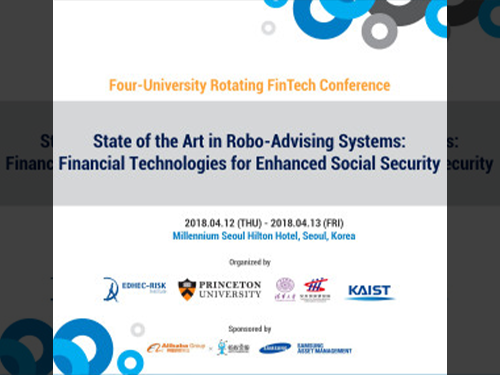 KAIST to Host FinTech Conference 2018
KAIST will be hosting a FinTech Conference with Princeton University (USA), Tsinghua University (China), and EDHEC Business School (France) in Seoul from April 12 to 13 titled State of the Art in Robo-Advising Systems: Financial Technologies for Enhanced Social Security.
The Bendhein Center for Finance and Department of Operations Research and Financial Engineering from Princeton University, Fintech Lab from Tsinghua University, and the Risk Institute from EDHEC will participate as co-hosting organizations in this conference organized by the Department of Industrial & Systems Engineering and the KAIST Center for Wealth Management Technologies.
The conference will discuss issues required for providing customized asset management to the public in terms of theory, technology, and industry.
During the conference, KAIST President Sung-Chul Shin and Chairman and CEO of the National Pension Service Sung Joo Kim will deliver welcoming addresses.
Professor John Mulvey from Princeton University, Professor Michael Dempster from Cambridge University, Professors Wei Xu and Changle Lin from Tsinghua University, Professor Lionel Martellini from EDHEC, and Professor Woo Chang Kim from KAIST are some of the invited speakers at the event.
Moreover, renowned experts in related fields will also participate in the conference, including Founder of Vanguard Group John Bogle, Jin Lee from Ant Financial, Youngsuh Cho from Shinhan Financial Group, Jung-Hwan Lee from Samsung Asset Management, and Hye Young Sung from the National Pension Service Research Institute.
Professor Kim said, “Only a small number of wealthy people can receive life-cycle customized asset management services due to the high cost structure; however, new technology derived from the Fourth Industrial Revolution can reduce the service price in an innovative manner, ultimately leading it to be popularized.”
“In an era with the poverty rate of older people reaching almost 50%.Fintech can enable individuals to manage their assets in an active manner, reinforcing social security without additional social costs in the period,” he added.
These four universities have been hosting the FinTech Conference since 2017. China will host the conference this fall, followed by France next year.
Samsung Asset Management, Alibaba Group, and Ant Financial will sponsor the conference. Anyone interested in this event can find more details at http://wmt.kaist.ac.kr/conference.html.
2018.04.02 View 8751
KAIST to Host FinTech Conference 2018
KAIST will be hosting a FinTech Conference with Princeton University (USA), Tsinghua University (China), and EDHEC Business School (France) in Seoul from April 12 to 13 titled State of the Art in Robo-Advising Systems: Financial Technologies for Enhanced Social Security.
The Bendhein Center for Finance and Department of Operations Research and Financial Engineering from Princeton University, Fintech Lab from Tsinghua University, and the Risk Institute from EDHEC will participate as co-hosting organizations in this conference organized by the Department of Industrial & Systems Engineering and the KAIST Center for Wealth Management Technologies.
The conference will discuss issues required for providing customized asset management to the public in terms of theory, technology, and industry.
During the conference, KAIST President Sung-Chul Shin and Chairman and CEO of the National Pension Service Sung Joo Kim will deliver welcoming addresses.
Professor John Mulvey from Princeton University, Professor Michael Dempster from Cambridge University, Professors Wei Xu and Changle Lin from Tsinghua University, Professor Lionel Martellini from EDHEC, and Professor Woo Chang Kim from KAIST are some of the invited speakers at the event.
Moreover, renowned experts in related fields will also participate in the conference, including Founder of Vanguard Group John Bogle, Jin Lee from Ant Financial, Youngsuh Cho from Shinhan Financial Group, Jung-Hwan Lee from Samsung Asset Management, and Hye Young Sung from the National Pension Service Research Institute.
Professor Kim said, “Only a small number of wealthy people can receive life-cycle customized asset management services due to the high cost structure; however, new technology derived from the Fourth Industrial Revolution can reduce the service price in an innovative manner, ultimately leading it to be popularized.”
“In an era with the poverty rate of older people reaching almost 50%.Fintech can enable individuals to manage their assets in an active manner, reinforcing social security without additional social costs in the period,” he added.
These four universities have been hosting the FinTech Conference since 2017. China will host the conference this fall, followed by France next year.
Samsung Asset Management, Alibaba Group, and Ant Financial will sponsor the conference. Anyone interested in this event can find more details at http://wmt.kaist.ac.kr/conference.html.
2018.04.02 View 8751 -
 KAIST Welcomes Global Participants to AI World Cup 2018
KAIST will host the AI (Artificial Intelligence) World Cup 2018 in August, and this time it is open to the international community. AI World Cup 2018 will be a very exciting challenge for extending the limit of academic and industrial applications based on AI technology.
KAIST, after launching its AI World Cup 2017 for domestic participants, is now hosting the AI World Cup 2018 for everyone. The AI World Cup will be comprised of three events: 1) Five on five AI Soccer 2) AI Commentator and 3) AI Reporter. Winner of each category, runner-up of AI Soccer, and 2nd runner-up of AI Soccer will receive awards with cash prizes.
For AI Soccer in which AI controlled robots team up to compete, the preliminary rounds will be held in July in a league format, and the final rounds will be played on August 20-22.
For AI Commentator and AI Reporter, eight finalists will be selected for each category based on scoring criteria, and their performance will be evaluated by the judges to select the winner from each category on August 22.
During the final rounds, a variety of events will also take place at KAIST, including tutorial sessions on AI technology, a poster session where students present their research works on AI, not necessarily limited to the scope of AI Soccer, AI Commentator, and AI Reporter, and panel discussions by prominent experts in the field of AI.
Moreover, renowned experts on AI will deliver their keynote addresses. The Cyberbotics CEO Olivier Michel will address his keynote speech on the topic ‘Simulation benchmarks and competitions: a fundamental tool to foster robotics research.’
The AI World Cup was established by the College of Engineering at KAIST to show that AI technology can be further extended to sports, soccer in particular.
Professor Jong-Hwan Kim, the inventor of AI World Cup and chairman of the organizing committee said, “I hope that this event will offer a great chance to develop AI technology for use in the coming years. I wish many people can enjoy the AI World Cup 2018. I would recommend that prospective teams not worry about the technical barrier when deciding whether to participate in the games. Participants from academia and industry can test whether their code runs well in the competition simulator; this way, they will know their level of play and perhaps they can further develop their algorithms.”
“We will also broadcast the final round of AI Soccer online so that people in remote areas can also enjoy watching the games. I am looking forward to seeing all of you at the AI World Cup. Any participant with a passion to prove excellence in AI technology is welcomed with open arms,” he added.
Anyone interested in the AI World Cup 2018 can register online via aiworldcup.org . Registration starts from April 1. The deadline for registration and final code submission is June 30.
(Cubical players in the figure for domestic AI Soccer competition have been replaced with cylindrical players for more agile movements while playing)
(Opening ceremony of AI World Cup 2017)
(Trophy and prize)
(Interview of participant)
(Casters commentating on game playing)
2018.03.30 View 8706
KAIST Welcomes Global Participants to AI World Cup 2018
KAIST will host the AI (Artificial Intelligence) World Cup 2018 in August, and this time it is open to the international community. AI World Cup 2018 will be a very exciting challenge for extending the limit of academic and industrial applications based on AI technology.
KAIST, after launching its AI World Cup 2017 for domestic participants, is now hosting the AI World Cup 2018 for everyone. The AI World Cup will be comprised of three events: 1) Five on five AI Soccer 2) AI Commentator and 3) AI Reporter. Winner of each category, runner-up of AI Soccer, and 2nd runner-up of AI Soccer will receive awards with cash prizes.
For AI Soccer in which AI controlled robots team up to compete, the preliminary rounds will be held in July in a league format, and the final rounds will be played on August 20-22.
For AI Commentator and AI Reporter, eight finalists will be selected for each category based on scoring criteria, and their performance will be evaluated by the judges to select the winner from each category on August 22.
During the final rounds, a variety of events will also take place at KAIST, including tutorial sessions on AI technology, a poster session where students present their research works on AI, not necessarily limited to the scope of AI Soccer, AI Commentator, and AI Reporter, and panel discussions by prominent experts in the field of AI.
Moreover, renowned experts on AI will deliver their keynote addresses. The Cyberbotics CEO Olivier Michel will address his keynote speech on the topic ‘Simulation benchmarks and competitions: a fundamental tool to foster robotics research.’
The AI World Cup was established by the College of Engineering at KAIST to show that AI technology can be further extended to sports, soccer in particular.
Professor Jong-Hwan Kim, the inventor of AI World Cup and chairman of the organizing committee said, “I hope that this event will offer a great chance to develop AI technology for use in the coming years. I wish many people can enjoy the AI World Cup 2018. I would recommend that prospective teams not worry about the technical barrier when deciding whether to participate in the games. Participants from academia and industry can test whether their code runs well in the competition simulator; this way, they will know their level of play and perhaps they can further develop their algorithms.”
“We will also broadcast the final round of AI Soccer online so that people in remote areas can also enjoy watching the games. I am looking forward to seeing all of you at the AI World Cup. Any participant with a passion to prove excellence in AI technology is welcomed with open arms,” he added.
Anyone interested in the AI World Cup 2018 can register online via aiworldcup.org . Registration starts from April 1. The deadline for registration and final code submission is June 30.
(Cubical players in the figure for domestic AI Soccer competition have been replaced with cylindrical players for more agile movements while playing)
(Opening ceremony of AI World Cup 2017)
(Trophy and prize)
(Interview of participant)
(Casters commentating on game playing)
2018.03.30 View 8706 -
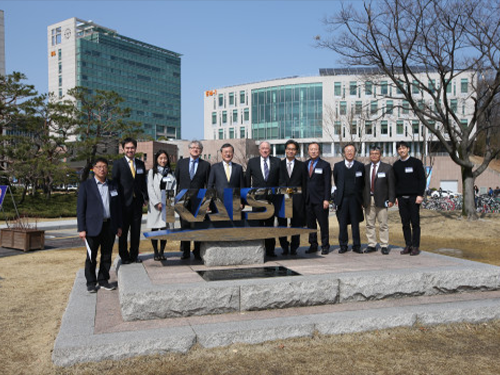 Nobel Laureates Brighten the Conversation at Global Leaders Forum
Two Nobel laureates who participated in the President’s Advisory Council joined the Global Leaders Forum as plenary speakers at KAIST on March 22. The forum highlighted the 25 events which were held during the Vision Week in celebration of the Vision 2031 Declaration Ceremony on March 20.
(President of KAIST Sung-Chul Shin, making welcoming remarks)
The Global Leaders Forum, titled “Scientific Discovery and Creativity,’ brought two prominent Nobel laureates in physics and chemistry. Dr. Klaus von Klitzing from the Max-Planck Institute for Solid State Research and Dr. Kurt Wüthrich from ETH Zürich inspired more than 300 audience members, including many young scholars, at Fusion Hall.
(Dr. Klaus von Klitzing from the Max-Planck Institute for Solid State Research)
Dr. Klitzing received the prize in 1985 in recognition of his discovery of the ‘integer quantum Hall effect.’ Meanwhile Dr. Wüthrich was awarded in 2002 for ‘"the development of Nuclear Magnetic Resonance methods for the determination of protein structures in solution."
Not only did they share their journey that led to the Nobel Prize, but also disclosed their personal stories that can relate to KAIST students as they pursue their scientific careers.
Many of the questions raised pertained to ‘creativity’ and ‘failure’: what is creativity and how to improve it and what is failure and how to deal with it. Dr. Klitzing replied, “If you want to go to a new direction, ask yourself inner question: what you really want to do.”
(From left: Dr. Klaus von Klitzing and Dr. Kurt Wüthrich from ETH Zürich)
Meanwhile, Dr. Wüthrich advised to set your goal first, before you start your research. “We tend to romanticize the creativity and it can be simulated. But it hardly does. It is important to know your goal first and set it appropriately.”
“Define failure as a process to learn something new, then you can comfortably move on,” he suggested in dealing with failure. “In many cases, the great achievement sometimes happens accidentally not intentionally. Maybe, you can see one success after 100 failures in the experiments. Nobody can predict the Nobel Prize quantitatively. Set the goal, and go to international conferences frequently if possible and evaluate where you are, compared with your international peers. Then, you can modify your goal and pursue what you want to do. Foremost, just enjoy your scientific work you are working with. That’s all. There’s no secret in the Nobel Prize.”
Since artificial intelligence is taking over people’s job, there’s also the question whether the concept of creativity should be modified due to technology development.
Regarding this question, Dr. von Klitzing made a strong point that the concept of creativity stays the same. He said that creativity is something new; in that sense, computers can never be creative because they use present, existing knowledge.
There was also a surprising moment. Dr. Wűthrich, who earned a bachelor’s degree in chemistry, physics, and mathematics, revealed to the audiences that his dream used to be a football player, not a scientist. He injured his foot, which prevented him from playing soccer, and that caused him to choose another career path.
Both laureates highlighted the importance of a positive attitude for their dreams and an open mindset for their colleagues and field of study.
Dr. von Klitzing pointed out that asking new questions can be the foundation of creativity. Hence, he urged students to be open minded and try to interact with one another.
Dr. Wűthrich commented that it is the job of professors to expand the view of students and guide younger generations. For young scientists, they should keep in mind that failure is something positive and that having an optimistic attitude is crucial.
(President of KAIST Sung-Chul Shin with the panelists and Dean of KAIST Academy Tae-Eog Lee)
(Interview of Dr. Kurt Wüthrich)
2018.03.27 View 4589
Nobel Laureates Brighten the Conversation at Global Leaders Forum
Two Nobel laureates who participated in the President’s Advisory Council joined the Global Leaders Forum as plenary speakers at KAIST on March 22. The forum highlighted the 25 events which were held during the Vision Week in celebration of the Vision 2031 Declaration Ceremony on March 20.
(President of KAIST Sung-Chul Shin, making welcoming remarks)
The Global Leaders Forum, titled “Scientific Discovery and Creativity,’ brought two prominent Nobel laureates in physics and chemistry. Dr. Klaus von Klitzing from the Max-Planck Institute for Solid State Research and Dr. Kurt Wüthrich from ETH Zürich inspired more than 300 audience members, including many young scholars, at Fusion Hall.
(Dr. Klaus von Klitzing from the Max-Planck Institute for Solid State Research)
Dr. Klitzing received the prize in 1985 in recognition of his discovery of the ‘integer quantum Hall effect.’ Meanwhile Dr. Wüthrich was awarded in 2002 for ‘"the development of Nuclear Magnetic Resonance methods for the determination of protein structures in solution."
Not only did they share their journey that led to the Nobel Prize, but also disclosed their personal stories that can relate to KAIST students as they pursue their scientific careers.
Many of the questions raised pertained to ‘creativity’ and ‘failure’: what is creativity and how to improve it and what is failure and how to deal with it. Dr. Klitzing replied, “If you want to go to a new direction, ask yourself inner question: what you really want to do.”
(From left: Dr. Klaus von Klitzing and Dr. Kurt Wüthrich from ETH Zürich)
Meanwhile, Dr. Wüthrich advised to set your goal first, before you start your research. “We tend to romanticize the creativity and it can be simulated. But it hardly does. It is important to know your goal first and set it appropriately.”
“Define failure as a process to learn something new, then you can comfortably move on,” he suggested in dealing with failure. “In many cases, the great achievement sometimes happens accidentally not intentionally. Maybe, you can see one success after 100 failures in the experiments. Nobody can predict the Nobel Prize quantitatively. Set the goal, and go to international conferences frequently if possible and evaluate where you are, compared with your international peers. Then, you can modify your goal and pursue what you want to do. Foremost, just enjoy your scientific work you are working with. That’s all. There’s no secret in the Nobel Prize.”
Since artificial intelligence is taking over people’s job, there’s also the question whether the concept of creativity should be modified due to technology development.
Regarding this question, Dr. von Klitzing made a strong point that the concept of creativity stays the same. He said that creativity is something new; in that sense, computers can never be creative because they use present, existing knowledge.
There was also a surprising moment. Dr. Wűthrich, who earned a bachelor’s degree in chemistry, physics, and mathematics, revealed to the audiences that his dream used to be a football player, not a scientist. He injured his foot, which prevented him from playing soccer, and that caused him to choose another career path.
Both laureates highlighted the importance of a positive attitude for their dreams and an open mindset for their colleagues and field of study.
Dr. von Klitzing pointed out that asking new questions can be the foundation of creativity. Hence, he urged students to be open minded and try to interact with one another.
Dr. Wűthrich commented that it is the job of professors to expand the view of students and guide younger generations. For young scientists, they should keep in mind that failure is something positive and that having an optimistic attitude is crucial.
(President of KAIST Sung-Chul Shin with the panelists and Dean of KAIST Academy Tae-Eog Lee)
(Interview of Dr. Kurt Wüthrich)
2018.03.27 View 4589 -
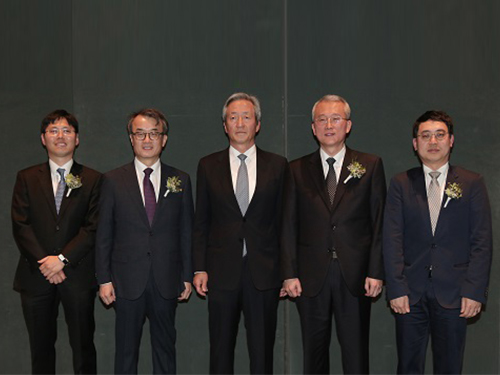 Two Professors Receive the Asan Medical Award
(Professor Ho Min Kim and Chair Profesor Eunjoon Kim (from far right)
Chair Professor Eunjoon Kim of the Department of Biological Sciences and Professor Ho Min Kim from the Graduate School of Medical Science & Engineering won the 11th Asan Medical Award in the areas of basic medicine and young medical scholar on March 21.
The Asan Medical Award has been recognizing the most distinguished scholars in the areas of basic and clinical medicines annually since 2007.
Chair Professor Kim won the 300 million KRW award in recognition of his research in the mechanism of synaptic brain dysfunction and its relation with neural diseases.
The young medical scholar’s award recognizes a promising scholar under the age of 40. Professor Kim won the award for identifying the key protein structure and molecular mechanism controlling immunocytes and neurons. He earned a 50 million KRW prize.
2018.03.26 View 9755
Two Professors Receive the Asan Medical Award
(Professor Ho Min Kim and Chair Profesor Eunjoon Kim (from far right)
Chair Professor Eunjoon Kim of the Department of Biological Sciences and Professor Ho Min Kim from the Graduate School of Medical Science & Engineering won the 11th Asan Medical Award in the areas of basic medicine and young medical scholar on March 21.
The Asan Medical Award has been recognizing the most distinguished scholars in the areas of basic and clinical medicines annually since 2007.
Chair Professor Kim won the 300 million KRW award in recognition of his research in the mechanism of synaptic brain dysfunction and its relation with neural diseases.
The young medical scholar’s award recognizes a promising scholar under the age of 40. Professor Kim won the award for identifying the key protein structure and molecular mechanism controlling immunocytes and neurons. He earned a 50 million KRW prize.
2018.03.26 View 9755 -
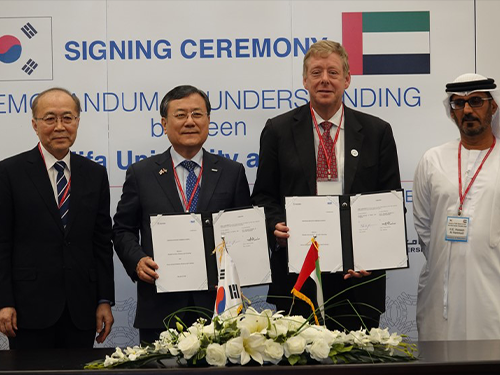 KAIST-KU Sign MOU on 4th Industrial Technology Development
(President Shin(second from left) poses with Khalifa University President Tod Laursen after signing an MOU in the UAE on March 25. Far left is Chairman of the NST Kwangyun Wohn and far right is the UAE Minister of Educatiion Hussain Al Hammadi.)
KAIST President Sung-Chul Shin and Khalifa University Interim President Tod Laursen signed an MOU on the Fourth Industrial Technology Development on March 25 in the UAE.
They signed the MOU during the UAE-ROK Nuclear Friendship and KAIST Alumni Night at Khalifa University co-hosted by KAIST and the Korea Atomic Energy Research Institute (KAERI). The MOU will bring new opportunities to further expand bilateral cooperation in education and training in the relevant technologies called for the era of the Fourth Industrial Revolution.
More than 100 dignitaries including Chairman of National Research Council of Science and Technology (NST) in Korea Dr. Kwangyun Wohn, President of KAERI Jaejoo Ha, the UAE Minister of Education His Excellency Hussain Al Hammadi, Minister of State for Advanced Sciences Her Excellency Sarah bint Yousef Al Amiri, and His Excellency Federal Authority for Nuclear Regulation (FANR) Director General Christopher Viktorsson attended the event. In particular, a significant number of Emirati graduates of the KUSTAR-KAIST education program and many others who completed various KAIST training programs joined the event.
The Nuclear Friendship Night was celebrating the completion of the first nuclear power plant in Barakah exported by Korea. This is the first nuclear reactor in the Middle East, which is to start operation later this year. The event also coincided with Korean President Moon Jae-In’s state visit to the UAE.
KAIST and KAERI gathered distinguished leaders from the higher education and nuclear industries at the event in response to the UAE government’s top national agenda of fostering future talents and promoting the nuclear industry in order to ensure energy security.
KAIST and Khalifa University signed an initial agreement in education and research in 2009 when the governments of Korea and the UAE signed a contract to build four nuclear power plants in Barakah. Since then, the two universities have worked together closely in the areas of nuclear engineering, bio-medical engineering, robotics, mechanical engineering, chemical engineering, and materials science. With this signing on the new MOU, the partnership between the two institutions will mark the second phase of educating high-caliber human resources in science and technology of the two countries.
The KAIST Alumni Night also brought more opportunities to appreciate the achievements that the two countries have made through collaboration in education and research, mostly represented in the field of nuclear technology between KAIST and Khalifa University. During the event, KAIST graduates also shared their experiences from the education at KAIST, followed by the welcoming speeches from the UAE Minister of Education and the UAE Minister of State for Advanced Sciences.
KAIST President Shin, in his welcoming speech at the event, said, “I look forward to more students in the UAE having the opportunity to experience the world’s top-level education and global environment that KAIST offers. The collaboration with Khalifa University and the UAE is very important for building both countries’ future growth.”
KU President Laursen said, “This MOU on research cooperation focusing on technologies for the Fourth Industrial Revolution, nuclear engineering, and other technical areas will further consolidate our partnership with KAIST and support us in developing human capital suitable to take on future challenges in the science and technology sectors. We firmly believe the talent pool of experts created by this initiative will contribute to the overall economic growth of the UAE.”
2018.03.26 View 10670
KAIST-KU Sign MOU on 4th Industrial Technology Development
(President Shin(second from left) poses with Khalifa University President Tod Laursen after signing an MOU in the UAE on March 25. Far left is Chairman of the NST Kwangyun Wohn and far right is the UAE Minister of Educatiion Hussain Al Hammadi.)
KAIST President Sung-Chul Shin and Khalifa University Interim President Tod Laursen signed an MOU on the Fourth Industrial Technology Development on March 25 in the UAE.
They signed the MOU during the UAE-ROK Nuclear Friendship and KAIST Alumni Night at Khalifa University co-hosted by KAIST and the Korea Atomic Energy Research Institute (KAERI). The MOU will bring new opportunities to further expand bilateral cooperation in education and training in the relevant technologies called for the era of the Fourth Industrial Revolution.
More than 100 dignitaries including Chairman of National Research Council of Science and Technology (NST) in Korea Dr. Kwangyun Wohn, President of KAERI Jaejoo Ha, the UAE Minister of Education His Excellency Hussain Al Hammadi, Minister of State for Advanced Sciences Her Excellency Sarah bint Yousef Al Amiri, and His Excellency Federal Authority for Nuclear Regulation (FANR) Director General Christopher Viktorsson attended the event. In particular, a significant number of Emirati graduates of the KUSTAR-KAIST education program and many others who completed various KAIST training programs joined the event.
The Nuclear Friendship Night was celebrating the completion of the first nuclear power plant in Barakah exported by Korea. This is the first nuclear reactor in the Middle East, which is to start operation later this year. The event also coincided with Korean President Moon Jae-In’s state visit to the UAE.
KAIST and KAERI gathered distinguished leaders from the higher education and nuclear industries at the event in response to the UAE government’s top national agenda of fostering future talents and promoting the nuclear industry in order to ensure energy security.
KAIST and Khalifa University signed an initial agreement in education and research in 2009 when the governments of Korea and the UAE signed a contract to build four nuclear power plants in Barakah. Since then, the two universities have worked together closely in the areas of nuclear engineering, bio-medical engineering, robotics, mechanical engineering, chemical engineering, and materials science. With this signing on the new MOU, the partnership between the two institutions will mark the second phase of educating high-caliber human resources in science and technology of the two countries.
The KAIST Alumni Night also brought more opportunities to appreciate the achievements that the two countries have made through collaboration in education and research, mostly represented in the field of nuclear technology between KAIST and Khalifa University. During the event, KAIST graduates also shared their experiences from the education at KAIST, followed by the welcoming speeches from the UAE Minister of Education and the UAE Minister of State for Advanced Sciences.
KAIST President Shin, in his welcoming speech at the event, said, “I look forward to more students in the UAE having the opportunity to experience the world’s top-level education and global environment that KAIST offers. The collaboration with Khalifa University and the UAE is very important for building both countries’ future growth.”
KU President Laursen said, “This MOU on research cooperation focusing on technologies for the Fourth Industrial Revolution, nuclear engineering, and other technical areas will further consolidate our partnership with KAIST and support us in developing human capital suitable to take on future challenges in the science and technology sectors. We firmly believe the talent pool of experts created by this initiative will contribute to the overall economic growth of the UAE.”
2018.03.26 View 10670 -
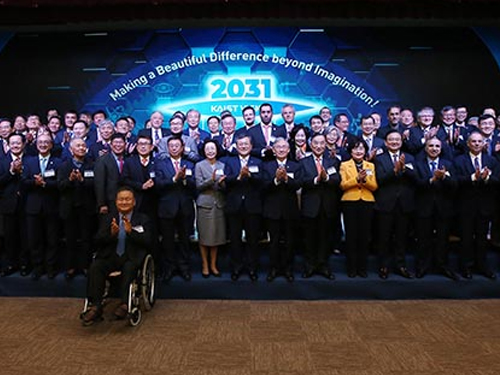 KAIST Unveils Vision 2031, a Blueprint for KAIST's Future
(Participants at the Vision 2031 Declaration Ceremony pose after the ceremony on March 20.)
KAIST presented a blueprint for KAIST’s future, “Vision 2031” looking toward its 60th anniversary. The strategic development plan for a “Global Value-Creative Leading University” aims at being one of the top universities in the world by the year 2031.
Unveiling its 2031 Vision, KAIST President Sung-Chul Shin presented the three-stage, five-year action plan during a ceremony held on March 20.
He stressed that innovation in the five pillars of education, research, technology commercialization, globalization, and future strategy will further advance the excellence of KAIST, to help it become a trailblazer in Korea and beyond.
President Shin said that Vision 2031 holds a special meaning, as the full support of the KAIST community was garnered to complete this shared vision for KAIST.
Approximately 140 members of the Vision Committee participated in the brainstorming process over the past ten months for reaching this vision. The committee went through consensus building procedures of public hearings engaging all of the stakeholders on campus as well as outside experts. The committee published “Vision 2031: KAIST’s Future Report” this month, detailing the action plan of innovation strategies for reaching its new vision as well as an expanded budget funding plan to secure 2 trillion KRW by 2031, up from the current 860 billion KRW.
First, in education, KAIST will foster creative leaders who will translate the knowledge created by science and technology into social values. In research, KAIST will conduct research projects to address both national and global challenges. KAIST will pursue becoming an entrepreneurial university that will enrich its technological value. In globalization innovation, KAIST will move forward to serve as a world bridge. Lastly, KAIST will steer toward the ‘What’ (problem definition) over the ‘How’ (problem solving) for addressing challenges in pursuing future strategy innovation.
The ceremony was held in Chung Kunmo Hall, in the newly opened the Academic Cultural Complex, with an attendance of more than 300 distinguished guests including global leaders in higher education, government, and industry, as well as from KAIST community.
Noted participants from abroad included KAIST President’s Advisory Council members such as Former President of ETH Zurich Rlaph Eichler, President of HKUST Tony Chan, President-elect Kazuya Masu of the Tokyo Institute of Technology, Former President of the National University of Singapore Tan Chorh Chuan, Nobel laureate Professor Kurt Wuthrich of the Scripps Research Institute, and Professor Klaus von Klitzing from the Max Planck Institute for Solid State Research. Former KAIST Presidents including Dr. Nam-Pyo Suh, Chairman of JoongAng Holdings Seok-hyun Hong, Elsevier Chairman Youngsuk Chi, KISWE Mobile Executive Chairman Jeong H. Kim also attended the ceremony.
In honor of the Vision 2031 declaration, KAIST is hosting 25 events during Vision Week from March 19 to 23 across the campus including academic forums, distinguished lectures, exhibits, and a coding challenge, among others. The opening of the Academic Cultural Center, an iconic building accommodating the new library, Cultural Building, and Vision Hall, launched Vision Week on Monday, March 19.
KAIST also dedicated Chung Kunmo Hall in the Academic Cultural Complex, a 300-seat capacity multi-purpose hall in honor of Professor Keun-Mo Chung, who played an instrumental role in founding KAIST in 1971.
Professor Chung submitted the proposal to US Aid to establish KAIST in 1969. US Aid asked the vice-president of Stanford University at the time, Frederick Terman, to conduct a feasibility study on the establishment of KAIST. The Terman Report, approving the founding of KAIST, was published in 1970 and KAIST was founded the next year. Following the dedication of Terman Hall in 2004, KAIST has now inducted its two founding figures.
“We had the guidebook of the Terman Report back then. We faithfully accomplished the initial mission and goals the Terman Report contained. At this critical juncture of the new global environment, we need to establish a new vision to continue to develop. As much as the Terman Report drove us to our current success, I hope the Vision 2031 KAIST Future Report will advance KAIST to its new chapter,” President Shin said.
Stressing that the ideal KAISTian is defined by the 3C spirit: Challenge, Creativity, and Caring, President Shin said, “Members of KAIST are expected to embrace challenges, generate creative ideas, and care for others. By recommitting to the five innovation strategies equipped with the KAIST spirit, KAIST will emerge as one of the top universities of science and technology by the year 2031 and contribute to the happiness and prosperity of humankind. I hope KAIST will be a great source of pride for Koreans and lay the foundation for Korea to take the lead in the age of the Fourth Industrial Revolution.”
2018.03.20 View 7693
KAIST Unveils Vision 2031, a Blueprint for KAIST's Future
(Participants at the Vision 2031 Declaration Ceremony pose after the ceremony on March 20.)
KAIST presented a blueprint for KAIST’s future, “Vision 2031” looking toward its 60th anniversary. The strategic development plan for a “Global Value-Creative Leading University” aims at being one of the top universities in the world by the year 2031.
Unveiling its 2031 Vision, KAIST President Sung-Chul Shin presented the three-stage, five-year action plan during a ceremony held on March 20.
He stressed that innovation in the five pillars of education, research, technology commercialization, globalization, and future strategy will further advance the excellence of KAIST, to help it become a trailblazer in Korea and beyond.
President Shin said that Vision 2031 holds a special meaning, as the full support of the KAIST community was garnered to complete this shared vision for KAIST.
Approximately 140 members of the Vision Committee participated in the brainstorming process over the past ten months for reaching this vision. The committee went through consensus building procedures of public hearings engaging all of the stakeholders on campus as well as outside experts. The committee published “Vision 2031: KAIST’s Future Report” this month, detailing the action plan of innovation strategies for reaching its new vision as well as an expanded budget funding plan to secure 2 trillion KRW by 2031, up from the current 860 billion KRW.
First, in education, KAIST will foster creative leaders who will translate the knowledge created by science and technology into social values. In research, KAIST will conduct research projects to address both national and global challenges. KAIST will pursue becoming an entrepreneurial university that will enrich its technological value. In globalization innovation, KAIST will move forward to serve as a world bridge. Lastly, KAIST will steer toward the ‘What’ (problem definition) over the ‘How’ (problem solving) for addressing challenges in pursuing future strategy innovation.
The ceremony was held in Chung Kunmo Hall, in the newly opened the Academic Cultural Complex, with an attendance of more than 300 distinguished guests including global leaders in higher education, government, and industry, as well as from KAIST community.
Noted participants from abroad included KAIST President’s Advisory Council members such as Former President of ETH Zurich Rlaph Eichler, President of HKUST Tony Chan, President-elect Kazuya Masu of the Tokyo Institute of Technology, Former President of the National University of Singapore Tan Chorh Chuan, Nobel laureate Professor Kurt Wuthrich of the Scripps Research Institute, and Professor Klaus von Klitzing from the Max Planck Institute for Solid State Research. Former KAIST Presidents including Dr. Nam-Pyo Suh, Chairman of JoongAng Holdings Seok-hyun Hong, Elsevier Chairman Youngsuk Chi, KISWE Mobile Executive Chairman Jeong H. Kim also attended the ceremony.
In honor of the Vision 2031 declaration, KAIST is hosting 25 events during Vision Week from March 19 to 23 across the campus including academic forums, distinguished lectures, exhibits, and a coding challenge, among others. The opening of the Academic Cultural Center, an iconic building accommodating the new library, Cultural Building, and Vision Hall, launched Vision Week on Monday, March 19.
KAIST also dedicated Chung Kunmo Hall in the Academic Cultural Complex, a 300-seat capacity multi-purpose hall in honor of Professor Keun-Mo Chung, who played an instrumental role in founding KAIST in 1971.
Professor Chung submitted the proposal to US Aid to establish KAIST in 1969. US Aid asked the vice-president of Stanford University at the time, Frederick Terman, to conduct a feasibility study on the establishment of KAIST. The Terman Report, approving the founding of KAIST, was published in 1970 and KAIST was founded the next year. Following the dedication of Terman Hall in 2004, KAIST has now inducted its two founding figures.
“We had the guidebook of the Terman Report back then. We faithfully accomplished the initial mission and goals the Terman Report contained. At this critical juncture of the new global environment, we need to establish a new vision to continue to develop. As much as the Terman Report drove us to our current success, I hope the Vision 2031 KAIST Future Report will advance KAIST to its new chapter,” President Shin said.
Stressing that the ideal KAISTian is defined by the 3C spirit: Challenge, Creativity, and Caring, President Shin said, “Members of KAIST are expected to embrace challenges, generate creative ideas, and care for others. By recommitting to the five innovation strategies equipped with the KAIST spirit, KAIST will emerge as one of the top universities of science and technology by the year 2031 and contribute to the happiness and prosperity of humankind. I hope KAIST will be a great source of pride for Koreans and lay the foundation for Korea to take the lead in the age of the Fourth Industrial Revolution.”
2018.03.20 View 7693